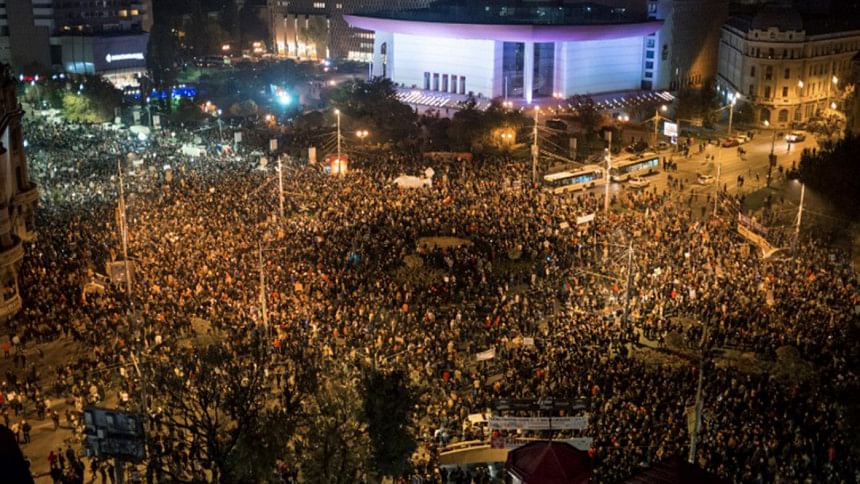Romania sees second night of protests

Thousands joined a march in the Romanian capital Bucharest, hours after Prime Minister Victor Ponta resigned over a deadly nightclub fire.
The protesters, reported to be at least 30,000 strong, demanded early elections and further political reform.
Rallies were also reported in other cities across the country.
It came a day after some 20,000 demonstrators spontaneously took to the streets of the capital, angry over the deaths of 32 people in Friday's fire.
Concerns that safety was compromised because of corruption - a long-standing issue in Romania - have fuelled public anger against the political elite, including Ponta.
'Country is rising up'
Ponta, who is currently facing trial on corruption charges, said in a televised address that he hoped his government's resignation would "satisfy the people who came out in the streets".
The mayor of the district of Bucharest where the nightclub fire occurred and the country's Interior Minister Gabriel Oprea also stepped down on Wednesday.
For a second consecutive night, protesters gathered late on Wednesday in University Square, a hub for anti-government rallies in central Bucharest.
They marched toward parliament with protesters urging others to join in as they went, shouting: "Get out of your homes if you care'' and "Don't be afraid, the country is rising up."
For a second consecutive night, protesters gathered late on Wednesday in University Square, a hub for anti-government rallies in central Bucharest.
They marched toward parliament with protesters urging others to join in as they went, shouting: "Get out of your homes if you care'' and "Don't be afraid, the country is rising up."
Demonstrators have been complaining of government corruption and poor safety supervision, and say they see Ponta's resignation as just the beginning of reform for the political elite.
The cities of Cluj, Timisoara and Constanta saw similar rallies on Wednesday.
President Klaus Iohannis, who has repeatedly called on Ponta to step down since the corruption scandal unfolded in June, called for a "sea change" in Romanian politics in the wake of the resignations.
He also voiced praise for Tuesday's protests, saying the club tragedy had "affected the nerve of the nation".
Ponta, who in September became the first sitting Romanian prime minister to go on trial for corruption, denies the charges.
What happens next
President Iohannis says he will start consulting political parties on Thursday to choose a prime minister and form a new government, with a view to getting a nomination in the coming days.
Ponta's Social Democratic Party (PSD) will probably remain in the existing coalition government until parliamentary elections, which are not due until December 2016.
Romania's junior ruling coalition party, the UNPR, on Wednesday gave its backing to the existing power-sharing government.
The UNPR's support ensures the coalition government retains a parliamentary majority.
Three owners of the club that caught fire on Friday have been arrested amid allegations that the venue was overcrowded, lacked the required number of emergency exits, and may not have been authorised to hold such a concert.
The blaze started when a rock band performing at Colectiv nightclub set off fireworks inside, setting the club's foam decor alight.
The club's single exit was overwhelmed in the panic that followed. More than 180 people were injured.

 For all latest news, follow The Daily Star's Google News channel.
For all latest news, follow The Daily Star's Google News channel. 



Comments